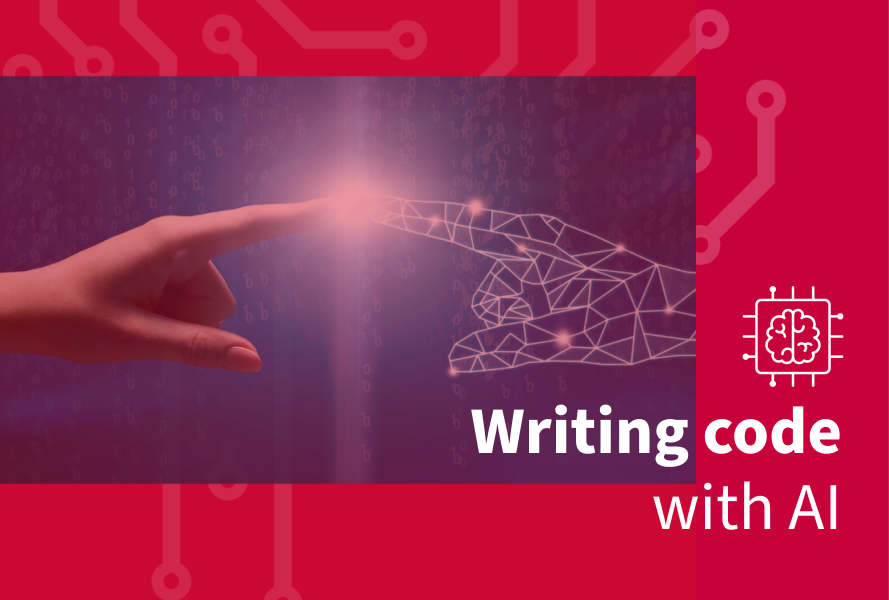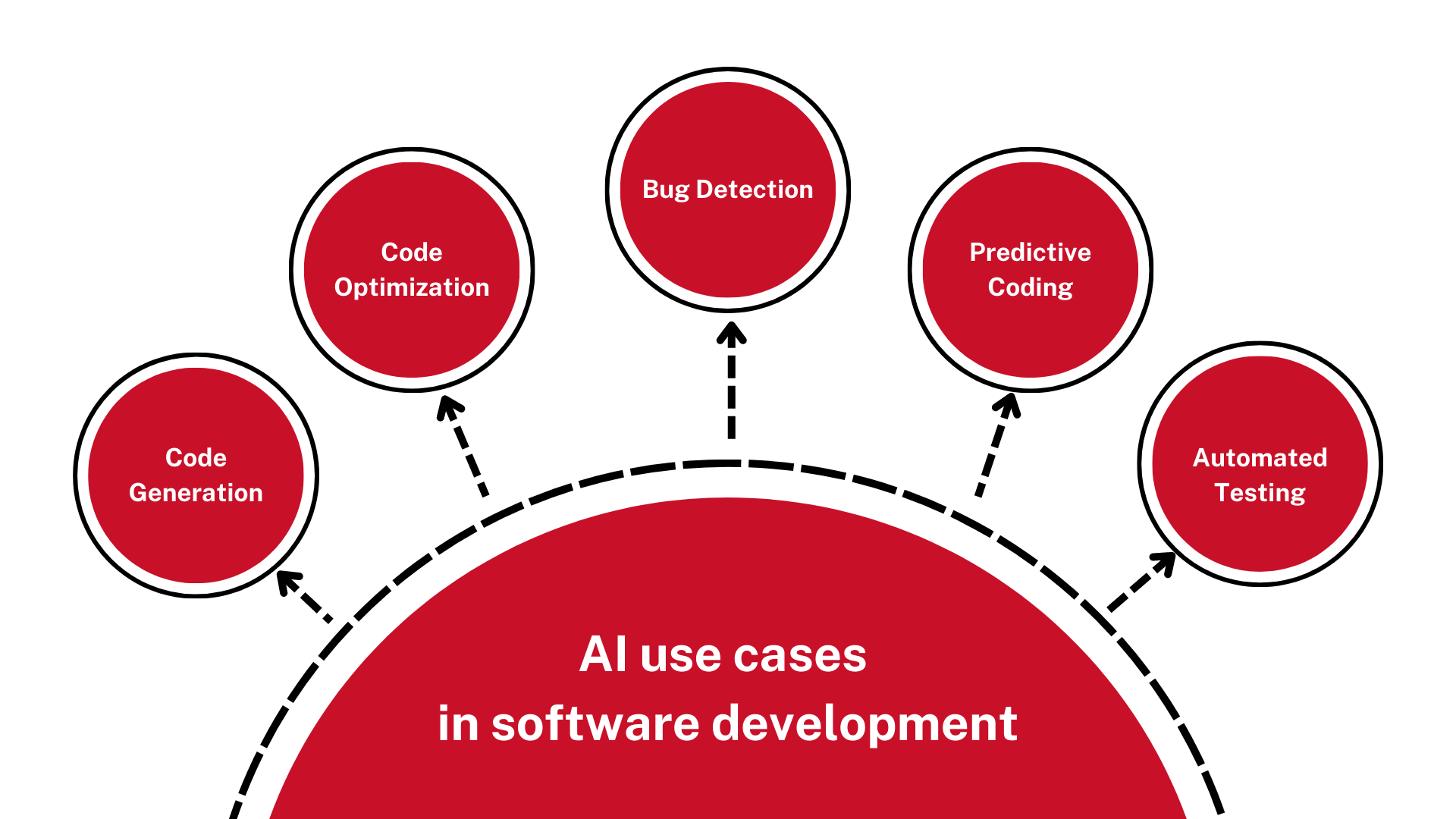Leveraging AI to write code faster and smarter
Artificial Intelligence (AI) has become one of the hottest topics right now. Everyone is talking about it, how it can be used, and its potential impact on society. Of course, there are still uncertainties surrounding AI when it comes to ethics, regulations, and limitations. AI has already started to change the way we live and work, and its influence is probably going to grow in the coming years. One area where AI is already making an impact is in the field of software development and writing code. Here’s our take on that as a software agency with 17 years of experience.

AI in software development
Artificial Intelligence is a very powerful technology at the moment. It has already found numerous applications in industries such as healthcare, finance, and transportation. Even everyday tasks like writing emails or finding new recipes can be optimized with tools like ChatGPT. In software development, AI can most importantly help streamline and optimize the process of writing code. With the help of AI-powered tools, developers can automate repetitive tasks, such as writing boilerplate code or performing code reviews, saving valuable time, and increasing productivity. Furthermore, AI can provide insights into code quality, performance, and optimization, enabling developers to write smarter, more efficient code. However, does that mean that AI is essential to stay competitive in the market?
Potential risks of leveraging AI in writing code
Before we explore how exactly AI can be used in software development, we definitely should explore the potential risks of working with it. While AI can provide numerous benefits to software development, it is not without its risks and limitations. When it comes to the AI generated results, we can treat it similarly to Google Translate. Yes, the results are often very good and fast, but you always have to double-check and make sure it’s 100% right. The more complex task you have, the more careful you must be with trusting the AI results. However, it is also crucial to consider the potential risks of leveraging AI in terms of data privacy and intellectual property rights.
Examples of risks
First, let’s look at the topic of data privacy. As the generated code is based on analyzed data, it is essential to ensure that there are no potential leaks or breaches in the system. Additionally, there may be legal implications to using AI-generated code, and it is important to take these into account to avoid costly legal disputes in the future. Another potential risk is the introduction of bias into the code, as AI algorithms are only as unbiased as the data they are trained on. This can lead to unintentional discrimination or inequity in software products. What’s more, the quality of the code produced by AI-powered tools may not always meet the standards required for the project, leading to potential errors and inefficiencies. Ethical concerns related to AI in software development include issues transparency and accountability. There is a need to ensure that the use of AI in software development is transparent and explainable to avoid confusion or mistrust among users.
Leveraging AI to write code & other use cases
Now that we have addressed the potential risks that come along with leveraging AI in software development, let’s explore how exactly you can use it as a developer. We’ve already mentioned that it can help streamline and optimize the process of writing code. Let’s have a look at possible use cases.

Code Generation
- In projects you may have repetitive tasks such as creating user interfaces or database schemes. Although important, these tasks are fairly mundane and straightforward. By using AI, you can generate code automatically for repetitive tasks. This approach saves considerable time and effort for our developers, whilst driving down the delivery time and costs for Customers. A win-win! When it comes to tasks with a level of complexity higher than low, using AI may not be sufficient. However, it can still give you a good base to work on. Thus, in general, it still may speed up development.
Code Optimization
- We have found that AI can analyze code and provide recommendations to optimize performance. Redundant code can be identified and removed, whilst AI can suggest more efficient algorithms instead, meaning the overall quality of the software for the Customer is better.
Bug Detection
- AI can analyze code and identify potential bugs before they occur. This can save developers time and effort by helping them identify and fix issues early in the development process. It can also detect potential vulnerabilities.
Predictive Coding
- AI can analyze code and predict what the developer will write next. This can help speed up the coding process by suggesting code snippets or completing code based on the developer’s previous patterns.
Automated Testing
- Finally, AI can be used to automate testing, reducing the time and effort required for developers to test their code. AI can analyze code and automatically create test cases or identify edge cases that need to be tested.
AI Tools
Of course, one of the most popular tools you can use to generate code is ChatGPT. Created by OpenAI, the AI chatbot ChatGPT may immensely speed up your process of writing code. However, as mentioned before, you must be aware of its potential risks, as the generated code might include bugs, security vulnerabilities, etc. Another tool you can use is Copilot (and soon Copilot X.) It uses deep learning algorithms to analyze code patterns and suggest code snippets based on the context. Copilot works by integrating with the code editor and providing suggestions as developers write, enabling them to complete tasks quickly and with fewer errors. It can be used for writing functions, classes, and entire code blocks, making it a valuable asset for developers looking to streamline their workflow. It is important to note that new software solutions based on AI are constantly coming out, and may bring some powerful options for you and your use cases in the future.
Will AI replace developers?
No. While AI can automate many tasks, it is unlikely that it will replace developers entirely. Rather, AI can complement the work of developers and allow them to focus on more complex tasks that require human expertise, such as problem-solving and innovation. Therefore, it is crucial to balance the use of AI with human expertise in software development.
Developers won’t be replaced by AI, however, they may be replaced by other developers who know how to effectively utilize AI.
Yameo’s take
Although we see how useful AI is for simple, repetitive tasks, we definitely won’t be relying on it entirely. The responsible use of Artificial Intelligence in software development requires a thorough understanding of its capabilities, limitations, and potential risks. While many tools are emerging that can help developers write code faster and more efficiently, there is still a need for human expertise to balance the limitations of AI. It is crucial to select and test AI-powered tools carefully and ensure that they meet the required standards. While we are excited about the potential of AI to improve our work, we recognize that it is not yet at a stage where we can trust it completely.

